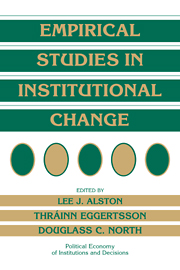Book contents
- Frontmatter
- Contents
- List of contributors
- Series editors' preface
- Acknowledgments
- Introduction
- A note on the economics of institutions
- Empirical work in institutional economics: an overview
- 1 Toward an understanding of property rights
- Economic variables and the development of the law: the case of western mineral rights
- 2 Impediments to institutional change in the former Soviet system
- Why economic reforms fail in the Soviet system: a property rights–based approach
- 3 Transaction costs and economic development
- Public institutions and private transactions: a comparative analysis of the legal and regulatory environment for business transactions in Brazil and Chile
- 4 The evolution of modern institutions of growth
- Constitutions and commitment: the evolution of institutions governing public choice in seventeenth-century England
- 5 Regulation in a dynamic setting
- The political economy of controls: American sugar
- 6 Price controls, property rights, and institutional change
- Roofs or stars: the stated intents and actual effects of a rents ordinance
- 7 Regulating natural resources: the evolution of perverse property rights
- Legally induced technical regress in the Washington salmon fishery
- 8 The politics of institutional change in a representative democracy
- A political theory of the origin of property rights: airport slots
- 9 The economics and politics of institutional change
- Paternalism in agricultural labor contracts in the U.S. South: implications for the growth of the welfare state
- Epilogue: economic performance through time
- Author index
- Subject index
- POLITICAL ECONOMY OF INSTITUTIONS AND DECISIONS
Paternalism in agricultural labor contracts in the U.S. South: implications for the growth of the welfare state
Published online by Cambridge University Press: 05 June 2012
- Frontmatter
- Contents
- List of contributors
- Series editors' preface
- Acknowledgments
- Introduction
- A note on the economics of institutions
- Empirical work in institutional economics: an overview
- 1 Toward an understanding of property rights
- Economic variables and the development of the law: the case of western mineral rights
- 2 Impediments to institutional change in the former Soviet system
- Why economic reforms fail in the Soviet system: a property rights–based approach
- 3 Transaction costs and economic development
- Public institutions and private transactions: a comparative analysis of the legal and regulatory environment for business transactions in Brazil and Chile
- 4 The evolution of modern institutions of growth
- Constitutions and commitment: the evolution of institutions governing public choice in seventeenth-century England
- 5 Regulation in a dynamic setting
- The political economy of controls: American sugar
- 6 Price controls, property rights, and institutional change
- Roofs or stars: the stated intents and actual effects of a rents ordinance
- 7 Regulating natural resources: the evolution of perverse property rights
- Legally induced technical regress in the Washington salmon fishery
- 8 The politics of institutional change in a representative democracy
- A political theory of the origin of property rights: airport slots
- 9 The economics and politics of institutional change
- Paternalism in agricultural labor contracts in the U.S. South: implications for the growth of the welfare state
- Epilogue: economic performance through time
- Author index
- Subject index
- POLITICAL ECONOMY OF INSTITUTIONS AND DECISIONS
Summary
Economists generally treat institutions as exogenous and examine their impact on the economy. But institutions, which define the “rules of the game” in an economy and the payoffs to pursuing different strategies, can change over time. Understanding the forces that prompt changes in institutions and how the payoffs to strategies change in response to institutional changes is important for understanding the developmental pattern of societies. For example, explicit contracts may be the most efficient means of structuring transactions under one institutional regime, but less formal agreements with entirely different enforcement mechanisms may be most efficient under another. Different ways of structuring transactions may lead to different growth paths.
In this paper we examine the rise and decline of paternalism in Southern labor relations. By “paternalism” we mean an implicit contract whereby workers exchange dependable labor services for a variety of goods and services. “Dependable” implies a long-term commitment to an employer that transcends the textbook notion of spot-market exchange. In return, workers receive such goods and services as credit, housing, medical and old-age assistance, and most importantly, protection from acts of violence. Paternalism, we argue, emerged along with a particular institution – the system of social control that emerged in the late 19th century and characterized the American South during the first half of the 20th century.
- Type
- Chapter
- Information
- Empirical Studies in Institutional Change , pp. 307 - 341Publisher: Cambridge University PressPrint publication year: 1996
- 12
- Cited by

